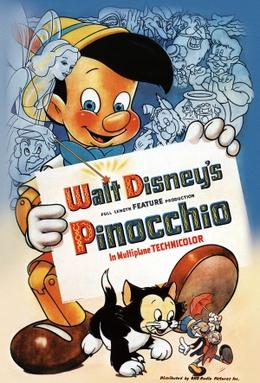Timeline: 1940-1941

We're back with Uncle Walt, who, fresh from his groundbreaking success with the world's first full-length animated feature, based on a fairy tale by the Grimm Brothers, decided to look again to children's tales for his next outing, this time to Italian storyteller Carlo Collodi, and his most famous story,
The Adventures of Pinocchio. Having read the book while in production with
Snow White, Disney loved it and immediately declared it would be the third movie they would work on,
Bambi at the time being the second he intended to unleash on the public. But problems realistically animating animals in
Bambi led to it being delayed, and so dropping all but the puppet's name for the title,
Pinocchio was pushed to the forefront.
The original story does not make the title character as sympathetic as Disney's film did. In the story, he kills the cricket who would become Jiminy, his conscience, and is later attended by its ghost. He is very precocious, as you would expect, but quite unlikeable, and the story is, as these things invariably were before the likes of Disney got their hands on them, quite dark. This would of course never do for an American cartoon film audience, and so many aspects of the story were changed, such as the introduction of the genial Jiminy Cricket, a more endearing aspect being given to the puppet and the role of the blue fairy, who features only slightly in the original story, being upgraded to a companion of the puppet. Obviously, many songs were also written for it, as would become the norm for Disney cartoons.
In addition, due to the unexpected but very welcome success of his first feature, Disney wanted to have known celebrities voice his characters, and so
Pinocchio became the first animated movie to have stars do the voices. Names which of course at this point in time mean nothing to us but who were big stars in their day were recruited: Frankie Darro, Walter Catlett, Evelyn Venable and the creator of the first ever million-selling record, “Ukelele Ike”, Cliff Edwards, were all signed up, while the voice of Pinocchio himself, due to Disney's insistence on it being a child who voiced him, went to Dickie Jones, only twelve years old but already having worked with legendary director Frank Capra (not not Franz Kafka!), though sadly the voice that would become synonymous with later cartoons (including that of Bugs Bunny), Mel Blanc, was deleted out of the movie after it was decided that his character would be a mute.
Pinocchio became the first animated feature to utilise proper effects animation, such as the sparkles from the blue fairy's wand, and the incredible underwater scenes, which were highly praised. Despite however winning two Academy Awards (the first animated movie to achieve this feat) it was not the huge box office success Disney had expected and hoped it would be, recouping less than half of its budget by 1947. Some of this was due to the onset of World War II, which left people with more important things to do than watch movies, and less money too, but though Walt was reported to have been very depressed about the initial box office returns, it of course picked up steam and to date has made over forty times its budget, earning a place in the National Film Registry and when the American Film Institute compiled their top ten best films ever in 2008,
Pinocchio came second in the animation genre, beaten only by its predecessor. It is now considered one of Disney's best films.
In comparison to many of Disney's later films, which could mostly be labelled under the terms “twee”, “cloying” or “sentimental”,
Pinocchio is a genuine morality tale, and though there are songs that we remember from it – mostly “When you wish upon a star” - which make it fit into what would later become unofficially known as the “Disneyfication” idea, it tends not to rely too much on jokes and clever lines, instead espousing the need for honesty, friendship and a strong work ethic. If Pinocchio wants to become a real boy, he has to work for it, and accept all the baggage that comes with that.
I couldn't say for certain, not being sufficiently knowledgeable about early Hollywood films, but as far as animated movies go, this would seem to be the one that started off a trend which would mostly continue through Disney – and other animated – movies, that of the hero and the sidekick. There's a very clear relationship established between Pinocchio and Jiminy Cricket, and whether it was Baloo and Mowgli in
The Jungle Book or Charlie Brown and Snoopy, from this point on a huge percentage of animated movies would feature this dynamic. For animated films at least, Walt Disney had scored yet another first.